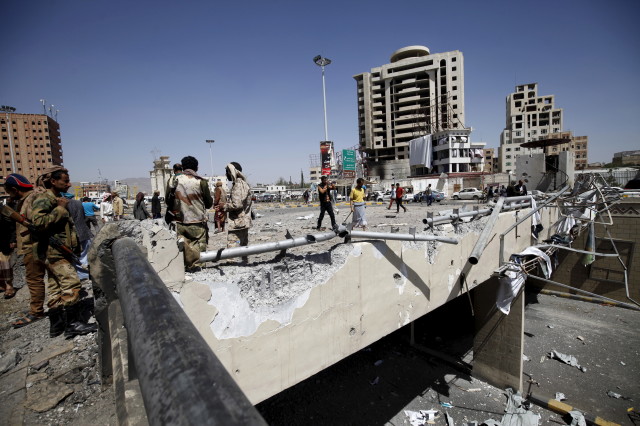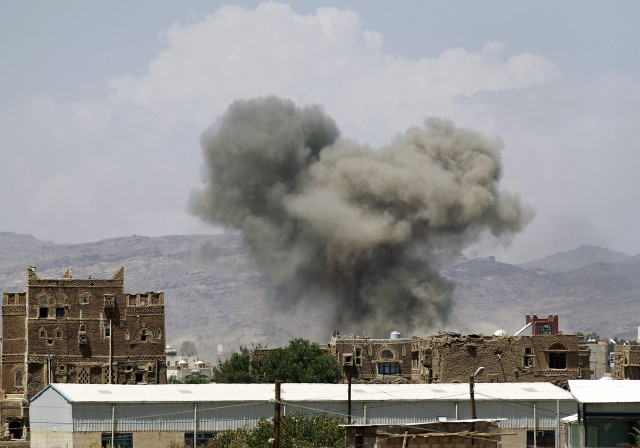By Barbara Slavin
As Saudi planes continue to bombard one of the world’s poorest nations, it is time for the Barack Obama administration to use its leverage as the Kingdom’s major arms supplier to put pressure on Riyadh to enter negotiations on a political solution to the conflict in Yemen.

Houthi militants stand at the site of a Saudi-led air strike which targeted a tunnel leading to the presidential house near the Petrol Station in Yemen’s capital Sanaa, October 1, 2015. (REUTERS)
Testifying this week before the Senate Foreign Relations Committee, Stephen Seche, who served as U.S. ambassador to Yemen from 2007-2010, said that Washington can promote a political solution in Yemen by delaying resupply of munitions to the Saudis.
“If the Saudis want a new supply of modern weaponry … we need to find out [their] endgame,” he said. “Who’s going to be at the table and who’s going to make concessions?”
Saudi Arabia began bombing its chronically unstable southern neighbor in March after Houthi rebels seized the Yemeni capital, Sanaa, and began marching south and taking more territory. Nearly 5,000 people have been killed in Yemen since then, many of them civilians. The United Nations says more than a million have been left homeless and the country has suffered massive damage to its already fragile infrastructure. More than 10 million people are in danger of starvation.
The Obama administration has been complicit in the Saudi-led offensive, providing targeting information as well as arms to a coalition that includes several members of the Gulf Cooperation Council (GCC).
U.S. support for the Saudis appears meant to reassure the Kingdom that a decades-old alliance with Washington is not eroding despite increasing U.S. energy independence and a recently concluded nuclear agreement with Saudi Arabia’s arch rival, Iran.
The Saudis have blamed the Houthi rebellion on Iranian interference. A Saudi prince and expert in naval special operations, Sultan bin Khalid al-Faisal, told a Washington audience this week that Iranian military officers and members of an Iran-backed Lebanese militia, Hezbollah, have been captured in Yemen.
However, the Houthis – members of a Shiite Muslim sect known as Zaydis – are notoriously independent and are believed to have begun their offensive without the prior approval of Tehran.
“Iran is not driving the train the Houthis are on,” Seche told the Senate committee. He and other experts say the main motivation for the Houthi escalation this year came from a former Yemeni president, Ali Abdullah Saleh. A Zaydi who has fought with both the Houthis and the Saudis in the past, Saleh was forced to step down and in 2011 after massive public protests.
Saleh was succeeded by Abed Rabbo Mansour Hadi, his vice president. The Saudis are demanding that the Houthis – who have already been chased out of Yemen’s major southern city, Aden — vacate Sanaa and allow Hadi to be reinstated.
Seche said any attempt by the Saudis to retake Sanaa by force would be “an absolute disaster,” noting that the capital has 2 million residents and former president Saleh remains popular there.
The Houthis have said they accept a U.N. peace plan that was mediated by Oman, but the Saudis have so far rebuffed overtures to enter negotiations about ending the conflict. Having purchased billions of dollars of foreign – primarily U.S. weapons – over the years and sent scores of Saudis to undergo military training in the U.S., the Kingdom seems more interested in showing off its military prowess than in ending the bloodshed.

Smoke billows from buildings after reported air strikes by the Saudi-led coalition on arms warehouses at Al-Dailami air base, on September 29, 2015, north of the capital Sanaa. (AFP)
The Obama administration, which is loath to become embroiled in more Middle Eastern wars, has seemed passive in allowing the Saudis to continue to pummel Yemen. But as the toll of death and destruction mounts, there is increasing bipartisan concern in Washington that Yemen risks becoming another failed state and an even more attractive haven for a potent al-Qaeda affiliate and for members of the group that calls itself the Islamic State.
Angered at the rising civilian death toll and Saudi reluctance to negotiate a political solution, Democrats on the Senate Foreign Relations Committee are holding up the sale of more precision-guided munitions to Saudi Arabia.
At this week’s hearing, Republican frustration with the Saudis was also evident. Sen. Bob Corker (R-Tenn.), chairman of the Foreign Relations Committee, said that the Yemen war has resulted in “an intolerable level of civilian casualties.” Corker added that he was not sure what the objectives or “end state” of the conflict were supposed to be.
Ranking Democrat, Ben Cardin of Maryland, also stressed the need for a political solution that recognizes the interests of the Houthis, who are Yemen’s ancestral rulers and represent about a third of the population.
While the Houthis relish their independence it is unlikely that the war will come to an end without talks that include Tehran. However, the Saudis have refused to allow Iranian diplomats to be present at multilateral meetings – most recently on the sidelines of the UN General Assembly in New York — about the crisis in Yemen as well as the civil war in Syria.
Relations between the two Persian Gulf powers have been troubled for years and deteriorated further in the wake of a stampede last month at the annual pilgrimage in Saudi Arabia known as the hajj in which more than 1,000 people, including more than more than 400 Iranians, died. Iranian leaders accused the Saudis of incompetent management of the hajj and negligent treatment of the victims.
The Iranians have also harshly criticized the new Saudi King, Salman, and note that the Yemen campaign is being led by Salman’s 29-year-old son, Prince Muhammad bin Salman, who was appointed defense minister despite his lack of military or diplomatic experience.
The defense minister’s cousin, Prince Sultan, boasted at the Capitol Hill briefing this week that the Saudis are now ready to lead the Middle East without the U.S. and can “take care of ourselves.”
But the rest of the world will also face the consequences if the Saudis’ Yemen campaign destroys what is left of the Yemeni state and delivers the country into the hands of al Qaeda and the Islamic State.

